Anpassungsfähigkeit und Resilienz des Finanzsystems
Diese Forschungsgruppe untersucht kritische Aspekte der Anpassungsfähigkeit und Widerstandsfähigkeit von Finanzsystemen. Sie analysiert die Auswirkungen von Naturkatastrophen auf Finanzsysteme, die Auswirkungen politischer Präferenzen für die grüne Transformation und die Bedeutung von Kultur in den Volkswirtschaften.
Forschungscluster
Finanzresilienz und RegulierungIhr Kontakt

Mitglied - Abteilung Finanzmärkte
PROJEKTE
07.2016 ‐ 12.2018
Relationship Lenders and Unorthodox Monetary Policy: Investment, Employment, and Resource Reallocation Effects
Leibniz-Gemeinschaft
We combine a number of unique and proprietary data sources to measure the impact of relationship lenders and unconventional monetary policy during and after the European sovereign debt crisis on the real economy. Establishing systematic links between different research data centers (Forschungsdatenzentren, FDZ) and central banks with detailed micro-level information on both financial and real activity is the stand-alone proposition of our proposal. The main objective is to permit the identification of causal effects, or their absence, regarding which policies were conducive to mitigate financial shocks and stimulate real economic activities, such as employment, investment, or the closure of plants.
01.2015 ‐ 12.2019
Interactions between Bank-specific Risk and Macroeconomic Performance
Deutsche Forschungsgemeinschaft (DFG)
Referierte Publikationen
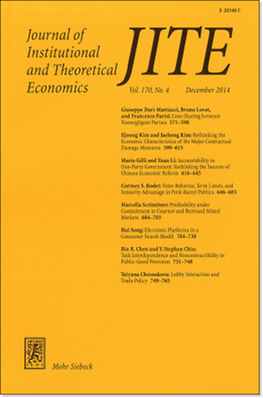
Default Options and Social Welfare: Opt In versus Opt Out
in: Journal of Institutional and Theoretical Economics JITE, Nr. 3, 2013
Abstract
We offer a social-welfare comparison of the two most prominent default options – opt in and opt out – using a two-period model of localized competition. We demonstrate that when consumers stick to the default option, the prevailing default policy shapes firms' ability to collect and use customer information, and affects their pricing strategy and entry decision differently. The free-entry analysis reveals that fewer firms enter under opt out as competition becomes harsher, and that opt out is the socially preferred default option.

Financial Constraints of Private Firms and Bank Lending Behavior
in: Journal of Banking and Finance, Nr. 9, 2013
Abstract
We investigate whether and how financial constraints of private firms depend on bank lending behavior. Bank lending behavior, especially its scale, scope and timing, is largely driven by bank business models which differ between privately owned and state-owned banks. Using a unique dataset on private small and medium-sized enterprises (SMEs) we find that an increase in relative borrowings from local state-owned banks significantly reduces firms’ financial constraints, while there is no such effect for privately owned banks. Improved credit availability and private information production are the main channels that explain our result. We also show that the lending behavior of local state-owned banks can be sustainable because it is less cyclical and neither leads to more risk taking nor underperformance.
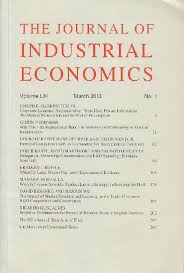
Bertrand Competition with an Asymmetric No-discrimination Constraint
in: Journal of Industrial Economics, Nr. 1, 2013
Abstract
Regulators and competition authorities often prevent firms with significant market power, or dominant firms, from practicing price discrimination. The goal of such an asymmetric no-discrimination constraint is to encourage entry and serve consumers' interests. This constraint prohibits the firm with significant market power from practicing both behaviour-based price discrimination within the competitive segment and third-degree price discrimination across the monopolistic and competitive segments. We find that this constraint hinders entry and reduces welfare when the monopolistic segment is small.
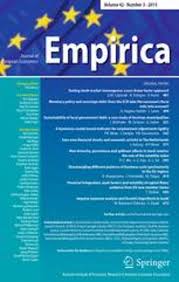
Regional Origins of Employment Volatility: Evidence from German States
in: Empirica, Nr. 1, 2013
Abstract
Greater openness for trade can have positive welfare effects in terms of higher growth. But increased openness may also increase uncertainty through a higher volatility of employment. We use regional data from Germany to test whether openness for trade has an impact on volatility. We find a downward trend in the unconditional volatility of employment, paralleling patterns for output volatility. The conditional volatility of employment, measuring idiosyncratic developments across states, in contrast, has remained fairly unchanged. In contrast to evidence for the US, we do not find a significant link between employment volatility and trade openness.

Foreign Bank Entry, Credit Allocation and Lending Rates in Emerging Markets: Empirical Evidence from Poland
in: Journal of Banking and Finance, Nr. 11, 2012
Abstract
Earlier studies have documented that foreign banks charge lower lending rates and interest spreads than domestic banks. We hypothesize that this may stem from the superior efficiency of foreign entrants that they decide to pass onto borrowers (“performance hypothesis”), but could also reflect a different loan allocation with respect to borrower transparency, loan maturity and currency (“portfolio composition hypothesis”). We are able to differentiate between the above hypotheses thanks to a novel dataset containing detailed bank-specific information for the Polish banking industry. Our findings demonstrate that banks differ significantly in terms of portfolio composition and we attest to the “portfolio composition hypothesis” by showing that, having controlled for portfolio composition, there are no differences in lending rates between banks.
Arbeitspapiere
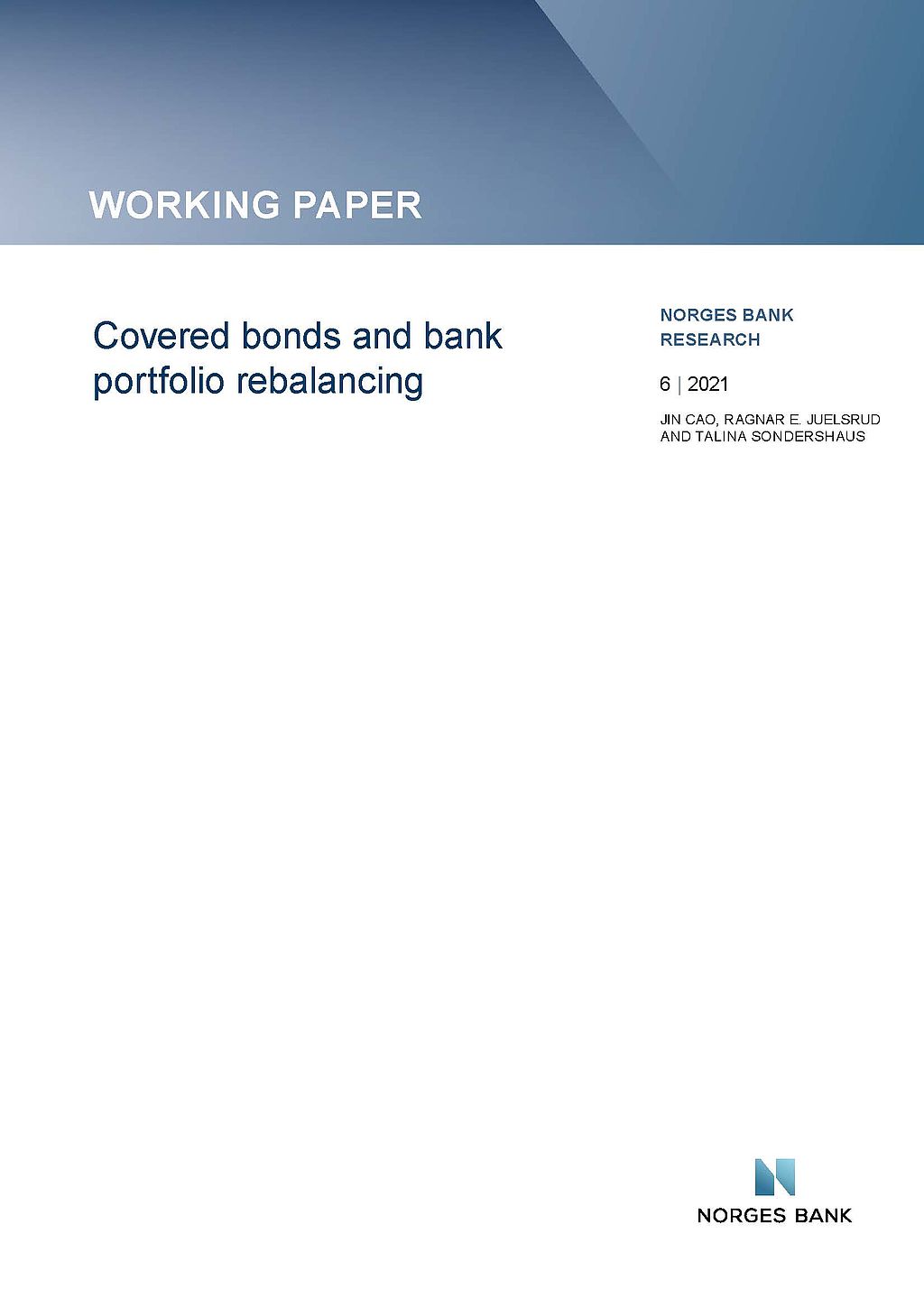
Covered Bonds and Bank Portfolio Rebalancing
in: Norges Bank Working Papers, Nr. 6, 2021
Abstract
We use administrative and supervisory data at the bank and loan level to investigate the impact of the introduction of covered bonds on the composition of bank balance sheets and bank risk. Covered bonds, despite being collateralized by mortgages, lead to a shift in bank lending from mortgages to corporate loans. Young and low-rated firms in particular receive more credit, suggesting that overall credit risk increases. At the same time, we find that total balance sheet liquidity increases. We identify the channel in a theoretical model and provide empirical evidence: Banks with low initial liquidity and banks with sufficiently high risk-adjusted return on firm lending drive the results.
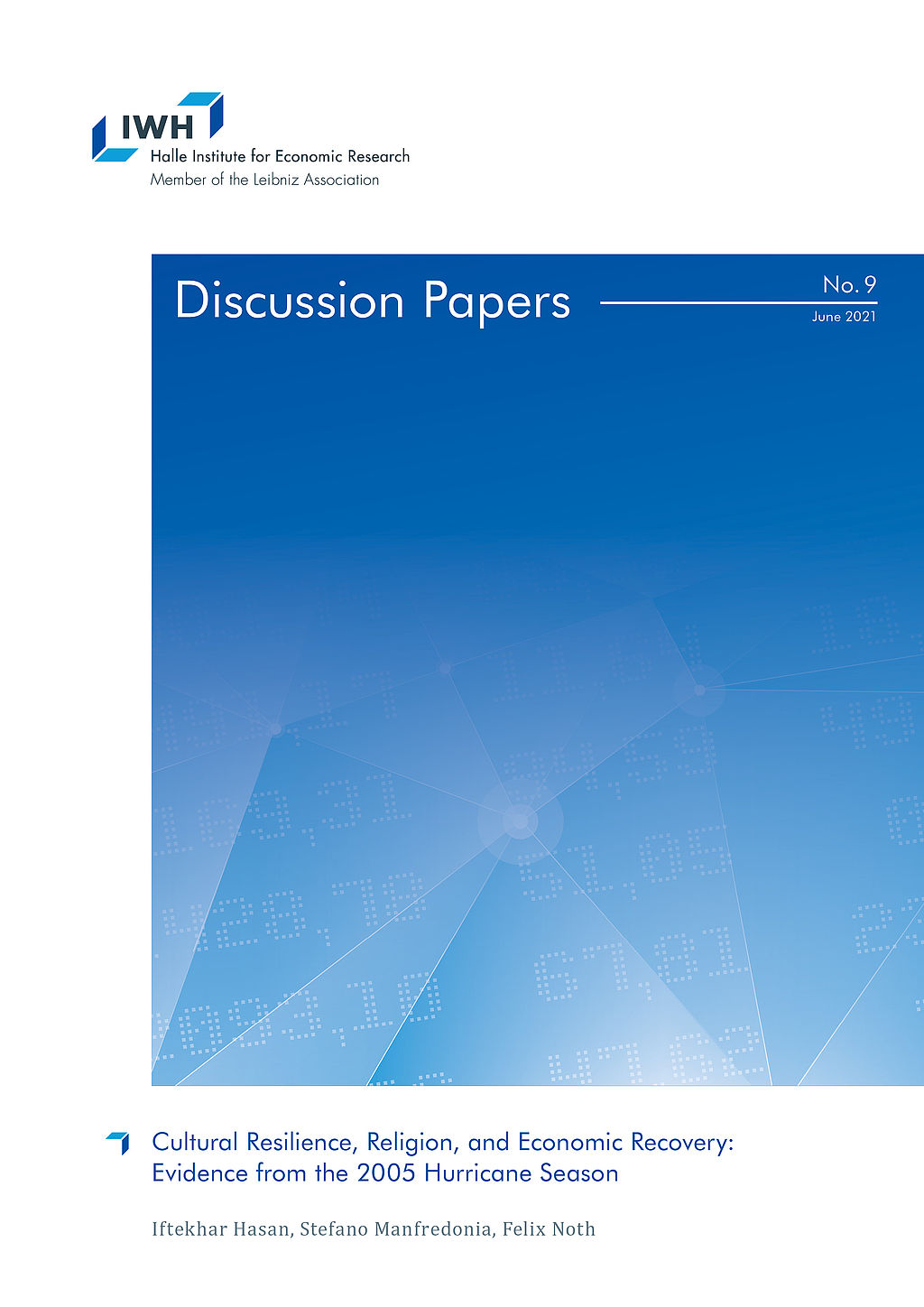
Cultural Resilience, Religion, and Economic Recovery: Evidence from the 2005 Hurricane Season
in: IWH Discussion Papers, Nr. 9, 2021
Abstract
This paper investigates the critical role of religion in the economic recovery after high-impact natural disasters. Exploiting the 2005 hurricane season in the southeast United States, we document that establishments in counties with higher religious adherence rates saw a significantly stronger recovery in terms of productivity for 2005-2010. Our results further suggest that a particular religious denomination does not drive the effect. We observe that different aspects of religion, such as adherence, shared experiences from ancestors, and institutionalised features, all drive the effect on recovery. Our results matter since they underline the importance of cultural characteristics like religion during and after economic crises.
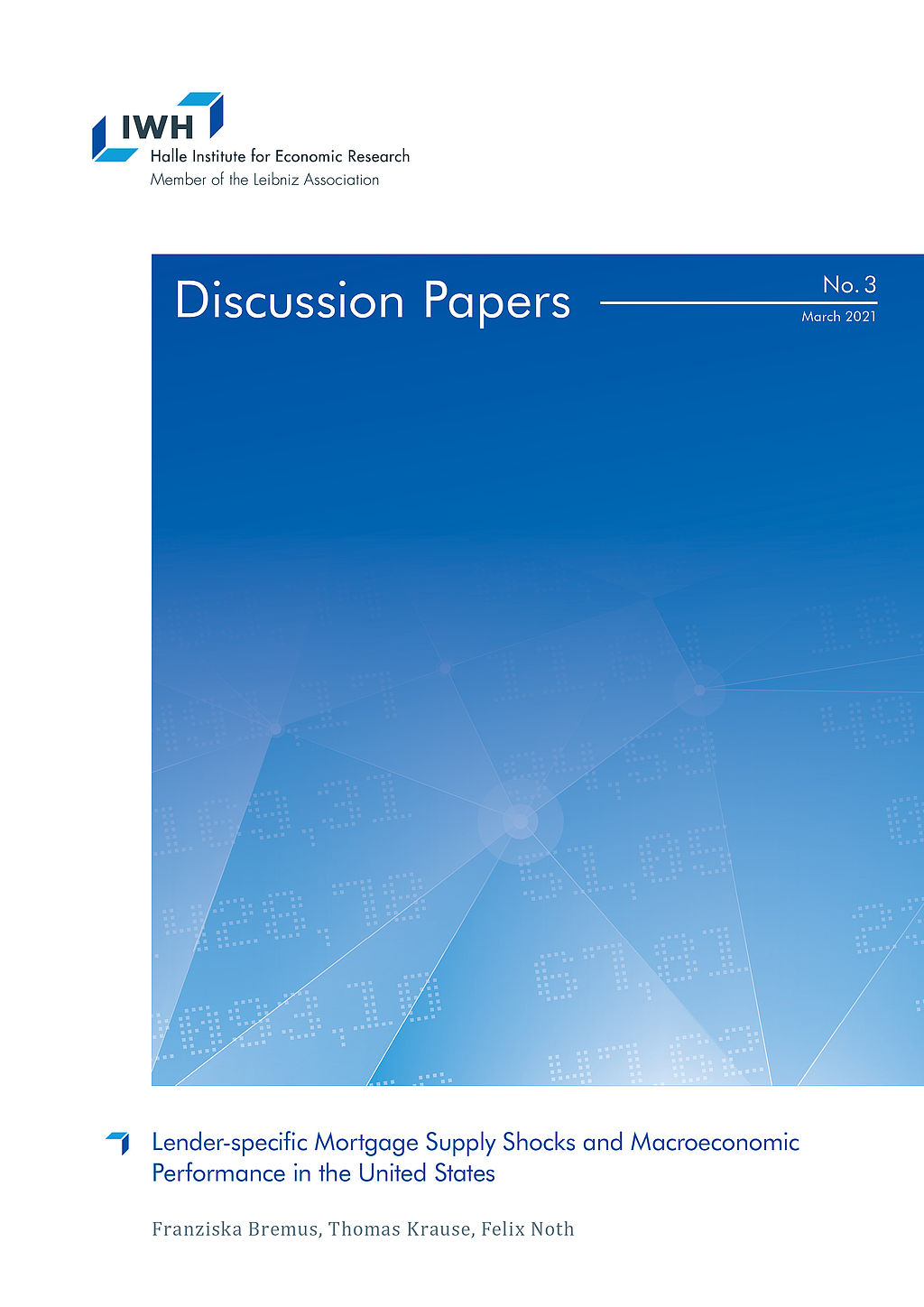
Lender-specific Mortgage Supply Shocks and Macroeconomic Performance in the United States
in: IWH Discussion Papers, Nr. 3, 2021
Abstract
This paper provides evidence for the propagation of idiosyncratic mortgage supply shocks to the macroeconomy. Based on micro-level data from the Home Mortgage Disclosure Act for the 1990-2016 period, our results suggest that lender-specific mortgage supply shocks affect aggregate mortgage, house price, and employment dynamics at the regional level. The larger the idiosyncratic shocks to newly issued mortgages, the stronger are mortgage, house price, and employment growth. While shocks at the level of shadow banks significantly affect mortgage and house price dynamics, too, they do not matter much for employment.
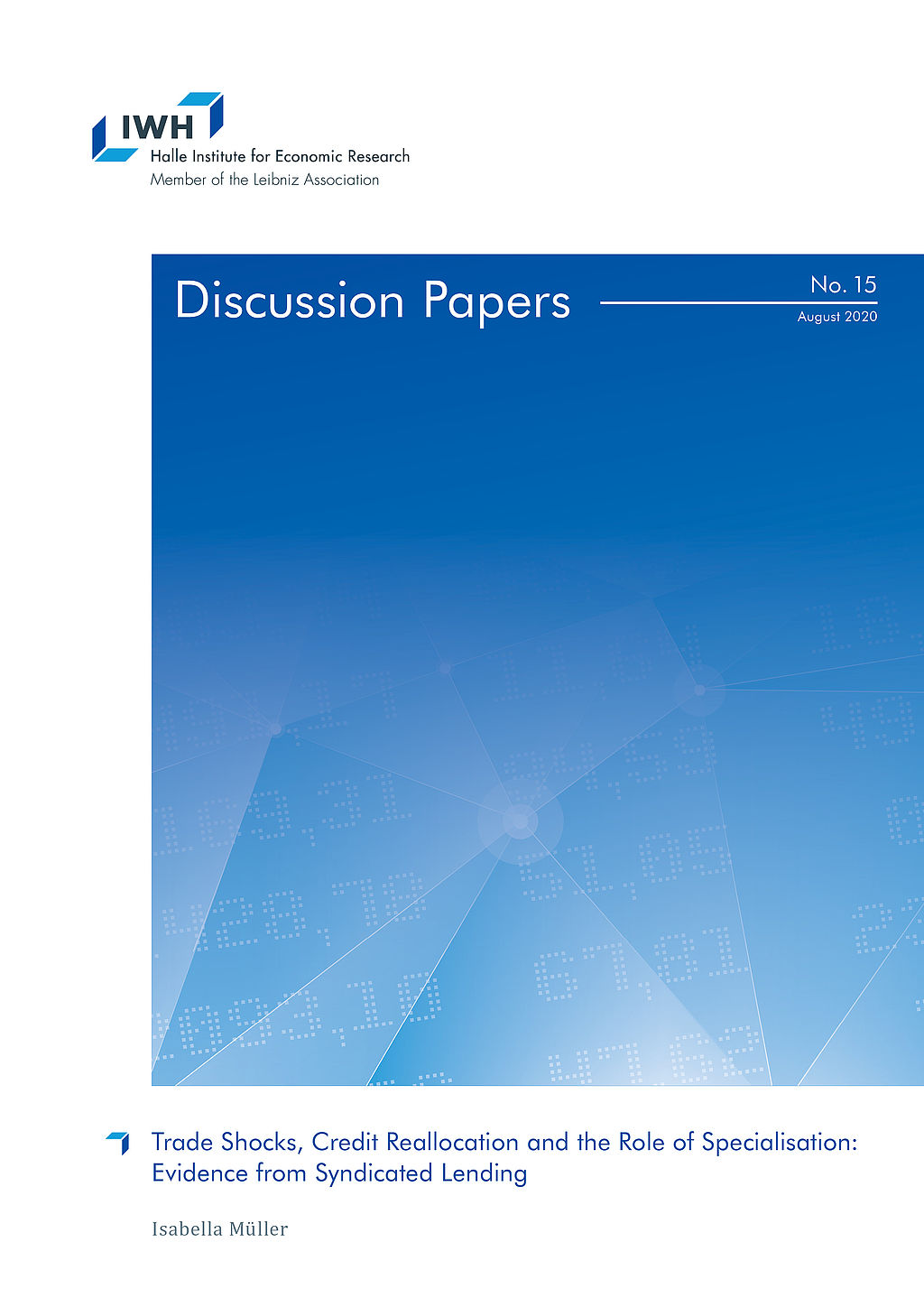
Trade Shocks, Credit Reallocation and the Role of Specialisation: Evidence from Syndicated Lending
in: IWH Discussion Papers, Nr. 15, 2020
Abstract
This paper provides evidence that banks cut lending to US borrowers as a consequence of a trade shock. This adverse reaction is stronger for banks with higher ex-ante lending to US industries hit by the trade shock. Importantly, I document large heterogeneity in banks‘ reaction depending on their sectoral specialisation. Banks shield industries in which they are specialised in and at the same time reduce the availability of credit to industries they are not specialised in. The latter is driven by low-capital banks and lending to firms that are themselves hit by the trade shock. Banks‘ adjustments have adverse real effects.
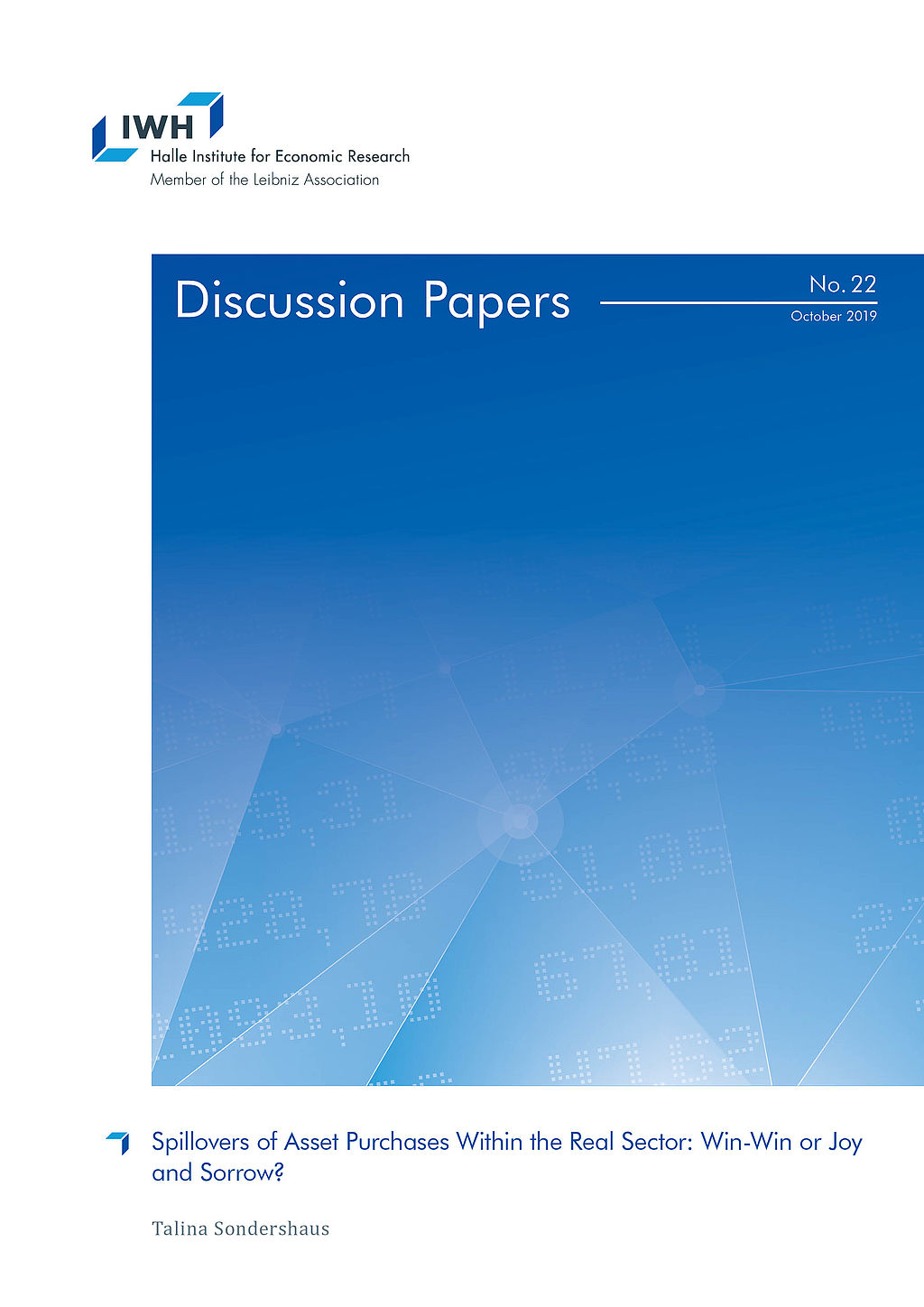
Spillovers of Asset Purchases Within the Real Sector: Win-Win or Joy and Sorrow?
in: IWH Discussion Papers, Nr. 22, 2019
Abstract
Events which have an adverse or positive effect on some firms can disseminate through the economy to firms which are not directly affected. By exploiting the first large sovereign bond purchase programme of the ECB, this paper investigates whether more lending to some firms spill over to firms in the surroundings of direct beneficiaries. Firms operating in the same industry and region invest less and reduce employment. The paper shows the importance to consider spillover effects when assessing unconventional monetary policies: Differences between treatment and control groups can be entirely attributed to negative effects on the control group.


















